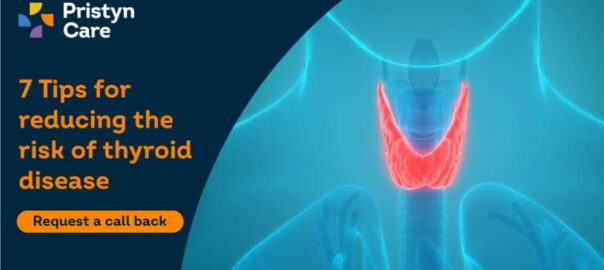![]() Views: 346
Views: 346
Thyroid Conditions During Pregnancy
Thyroid problems during pregnancy can result in severe complications, including stillbirth, premature birth, miscarriage, etc. If you have a thyroid issue before pregnancy or are at risk of thyroid issues during pregnancy, you should consult your OB/GYN about it and make sure your pregnancy completes without any complications.
Dedicated Support at Every Step!
Our Doctors are available 24 hours a day, 7 days a week to help you!
Table of Contents
What are the most common types of thyroid disorders during pregnancy?
The thyroid gland is a tiny butterfly shaped gland located in the neck. It is an important endocrine gland that makes T3, T4, and other hormones that regulate metabolism, heart rate, etc. Often thyroid problems occur as pre-existing conditions, but many women develop thyroid disorders during pregnancy, especially during 1st pregnancies, or just after they've given birth.
During the first trimester, the baby’s thyroid gland hasn’t developed enough so it depends on its mother for thyroid hormone, so thyroid issues in the mother can affect the baby’s development as well.
Most common thyroid disorders are:
Hyperthyroidism
Hyperthyroidism is a condition in which the thyroid gland becomes overactive and forms too many thyroid hormones, causing the body’s functions to speed up. Hyperthyroidism during pregnancy is usually caused by Graves’ disease, an autoimmune disorder. It can also be linked to hyperemesis gravidarum - an extreme form of morning sickness, or thyroid nodules.
Hypothyroidism
Hypothyroidism is a condition in which the thyroid gland becomes underactive and the body’s functions slow down due to a lack of thyroid hormones. Hypothyroidism during pregnancy is usually linked to Hashimoto’s disease, an autoimmune condition.
No Cost EMI, Hassle-free Insurance Approval
How are thyroid conditions diagnosed during pregnancy?
Your OB/GYN will test you for thyroid issues during pregnancy only if you are at high risk for it or are already exhibiting symptoms for it. Signs of thyroid disease during pregnancy are:
- Fast and irregular heartbeat
- Trouble dealing with heat
- Extreme tiredness
- Shaky hands or muscle cramps
- Issues with memory and concentration
- Unexplained weight loss or inability to gain appropriate weight during the pregnancy
- Rash with extreme coughing
- Sore throat
- Dizziness, etc.
If you are exhibiting these symptoms, your obstetrician will prescribe a blood test for thyroid hormones and thyroid stimulating hormone (also called TSH) in your body to determine whether you have a thyroid issue.
How to know if you are at risk for thyroid disease during pregnancy?
You are at higher risk of developing thyroid disease during pregnancy if:
- you currently have a benign thyroid issue like thyroid nodules, goiter, etc.
- you had a thyroid condition in the past
- you have a family history of autoimmune thyroid disorders, like Graves disease, Hashimoto’s disease, etc.
- you have type I diabetes
- your neck was recently exposed to high levels of radiation
- you have high hCG levels early in the pregnancy
Which complications can result from thyroid disease during pregnancy?
Problems linked with hyperthyroidism are:
- Preeclampsia, high blood pressure, after the 20th week of the pregnancy, affects other organs like kidneys, liver, heart, etc.
- Pulmonary hypertension, high blood pressure that affects arteries in the lungs and right side of the heart
- Placental abruption, placenta separates from the uterus wall before birth
- Heart failure, heart can’t pump enough blood to the rest of the body
- Thyroid storm, life-threatening condition that can lead to heart failure
- Premature birth, birth before 37 weeks of pregnancy, which can threaten the baby’s life
- Goiter, thyroid enlargement in the baby
- Low birthweight of the baby, i.e., below 5 pounds, 8 ounces
- Autoimmune thyroid problems in the baby
- Miscarriage or stillbirth, i.e., the baby dies around the 20th week of the pregnancy
Problems linked with hypothyroidism are:
- Anemia in women, so the body doesn’t get enough oxygen
- Gestational hypertension, i.e., high BP after the 20th week of the pregnancy that disappears after childbirth
- Preeclampsia, high BP that is affecting other parts of the body
- Placental abruption, detachment of placenta before birth
- Postpartum hemorrhage ( PPH), heavy bleeding after birth upto 12 weeks after childbirth
- Myxedema, severe untreated hypothyroidism that can lead to coma
- Heart failure, heart doesn’t pump enough blood
- Infantile myxedema, severe hypothyroidism leading to dwarfism, intellectual disabilities, etc., in the baby
- Low birthweight of the baby
- Growth and brain & nervous system development abnormalities in the baby
- Thyroid problems like Hashimoto’s disease in the baby
- Miscarriage or stillbirth, the baby dies around the 20th week of the pregnancy
How are thyroid problems managed during pregnancy and breastfeeding period?
Some thyroid medicines can harm the baby during pregnancy and breastfeeding, so the OB/GYN has to carefully consider the condition before prescribing medication for it.
For hyperthyroidism
Most patients do not need any treatment for mild hyperthyroidism, but for severe cases, they need to take antithyroid medicine. The most common medicine for hyperthyroidism is propylthiouracil in the first trimester and methimazole in the second and third trimesters.
The timing is important as propylthiouracil after the first trimester can result in liver problems and methimazole can result in birth defects. Radioactive iodine is a big NO as it can result in thyroid issues in the baby. It’s safe to take antithyroid medicines in low doses during breastfeeding.
For hypothyroidism
Hypothyroidism during pregnancy is generally treated using levothyroxine, which replaces T4 and functions in its place. On the other hand, T3 hormone replacements are not safe during pregnancy. If you are already taking thyroid replacements before pregnancy, you should consult your doctor about increasing your medication.
What are the side-effects of thyroid management during pregnancy?
For hyperthyroidism
Antithyroid drugs can result in the following side-effects during pregnancy:
- Hypothyroidism in the baby
- Allergic reactions like rashes, itching, etc.
- Decrease in white blood cell production, making infections more common and harder to fight
- Liver failure
You should stop taking antithyroid medicines if you experience any of the following symptoms:
- Jaundice
- Abdominal pain
- Constant sore throat
- Fever
- Tiredness or weakness
- Skin rashes, itching, or easy bruising
- Loss of appetite
For hypothyroidism
Thyroid replacement medicines can travel through the placenta and affect the baby’s development if it is not taken in proper doses.
Also Read: Tips For Reducing The Risk Of Thyroid Disease
Postpartum thyroiditis- Symptoms & Management
Postpartum thyroiditis is an autoimmune condition, which involves the inflammation of the thyroid gland. It affects about 1 in 20 women during the first year after childbirth. It is also very common in women with type 1 diabetes.
During the issue, the thyroid hormones stored in the gland leak out, leading to hyperthyroidism that lasts for about 3 months. However, after this period, the damage to the thyroid gland leads to hypothyroidism that doesn’t go away even after childbirth. While this is the common progression of the disease, its stages can also occur in isolation.
Symptoms of postpartum thyroiditis
There are little to no symptoms of the hyperthyroid phase. Mild symptoms that can occur during this phase are irritability, trouble dealing with heat, tiredness, trouble sleeping, and fast heartbeat. Symptoms of hypothyroid phase are:
- Tiredness and moodiness
- Trouble dealing with cold
- Dry skin
- Tingling sensation in the lims
- Trouble concentrating
- Postpartum depression, etc.
Management of postpartum thyroiditis
Since the symptoms of hyperthyorid phase are barely noticeable, they rarely need treatment. If the patient has a very high heart rate or blood pressure, they can take mild medication for it. Thyroid replacement hormones are the best way to manage postpartum thyroiditis during the hypothyroid phase. It is often safe to take mild beta-blockers and thyroid hormone replacements while breastfeeding as they do not transfer through mother’s milk.








